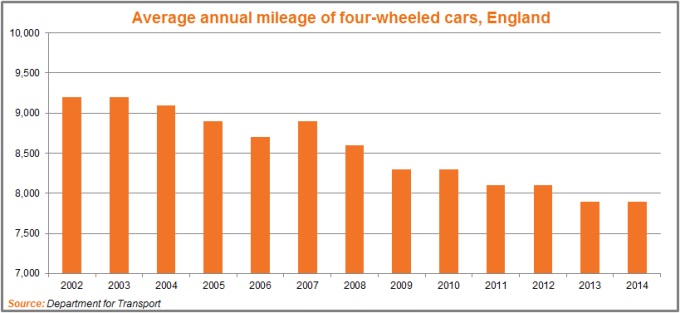Dive deep enough into the National Travel Survey, which had its latest edition published a couple of months ago, and you’ll discover the figures depicted below. They show the average annual mileage of four-wheeled cars in England, for every year from 2002 to 2014. Specifically, four-wheeled cars that are fuelled by either petrol or diesel. So, sadly, any hydrogen-powered Reliant Robins in Scotland are out.

You’ll notice from the chart that mileage is on a downwards trend. In 2002, when the figures were first collected, the average car did 9,200 miles a year. Last year, it was 7,900 – which is the lowest total on record. The same is true even if we just consider company cars. The average company car did 20,500 miles in 2002. Last year, it was 19,500.
This coincides with trends elsewhere in the National Travel Survey. In recent years, people have been making fewer trips by car, spending less time behind the dashboard, and a little more time on public transport such as trains and buses. You wouldn’t realise it when you’re stuck in yet another queue on the M25, but we’re driving less and less.
Why mention it now? Because this week, 23rd to 29th November, is Road Safety Week. And, according to the official website, this year’s event is ‘all about encouraging people to think about their car use and how they might “drive less, live more”.’
Drive less, live more. It’s a fairly straightforward idea. The organisers of Road Safety Week, the charity Brake, want us to think more about the necessity of our car journeys. For if there are fewer car journeys, then, at least in theory, there is also less pollution, less congestion, less expense – and, crucially, fewer accidents.
It might seem strange that Brake are promoting something that, according to all the available figures, we’re doing anyway. Yet it does actually make sense. Every death on or from our roads is, after all, a tragedy – and it’s worth considering all options for preventing them. Awareness-raising schemes can always help with that. For all we know, they may have already.
Besides, we cannot know that the trends of recent years will continue of their own accord. One explanation for why car journeys have declined is the economy: after the financial crisis, we’re all being much more careful about how and why we spend our money. But this means that the figures could rise again with the growth figures. Our old, more profligate ways could return.
Which perhaps explains why Brake are being vigilant and not just luxuriating in the current statistics. And we shouldn’t either. If may be difficult for company car drivers to drive less, as business determines what they do. But we can all make choices in our free time. Do we really need to drive to the shop around the corner? Or can we walk? Someone’s life might depend on the answer.
For more information about Road Safety Week, including a free action pack, please click here.




